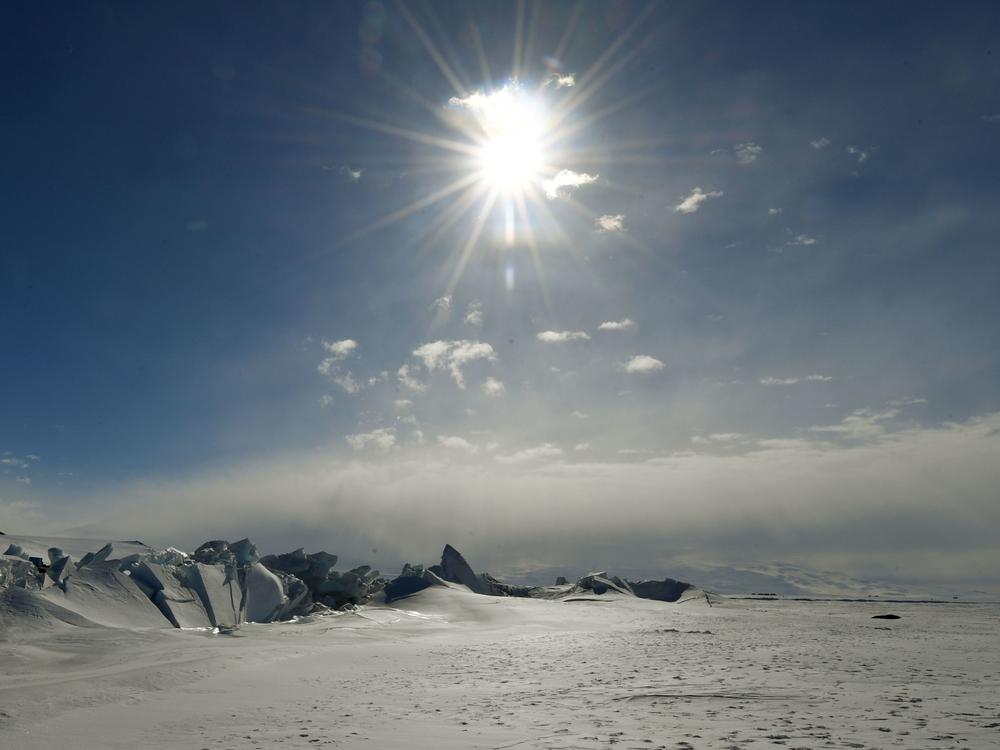Section Branding
Header Content
Preet Chandi is the first woman of color to complete a solo expedition in Antarctica
Primary Content
Preet Chandi has made a habit of pushing herself, tackling increasingly challenging endurance events over the years, from ultramarathons to mountaineering.
And fresh off a grueling ski expedition in Antarctica, the 32-year-old has now made history. "Polar Preet" is believed to be the first woman of color to complete an unsupported expedition to the South Pole.
The British army officer and physiotherapist, who is of Indian heritage and the Sikh faith, completed the 700-mile trip in just 40 days, according to a Monday blog post. She documented her journey online and on Instagram, posting daily updates with shoutouts to those who supported and inspired her.
"This expedition was always about so much more than me," Chandi wrote on Day 40. "I want to encourage people to push their boundaries and to believe in themselves, and I want you to be able to do it without being labelled a rebel. ... I dont want to just break the glass ceiling, I want to smash it into a million pieces."
Chandi wrote on her website that she didn't know much about Antarctica — other than its status as "the coldest, highest, driest and windiest continent on Earth" — when she started planning her expedition more than two years ago, which is why she wanted to go there.
Only a few female adventures have completed solo, unsupported treks on the continent, starting with Norway's Liv Arnesen in 1994. Chandi said she wanted to add more names and diversity to that list, in the hopes of inspiring future generations to pursue their goals and push boundaries.
"By promoting and completing this challenge, it allows me to act as a role model to young people, women and those from ethnic backgrounds," she wrote.
Chandi is also on a financial mission to help women embark on adventures of their own. She set up an online fundraiser for the expedition, saying she would use half of the funds to cover her medical, training and logistical expenses and the other half to set up a yearly adventure grant for women.
The grant doesn't have to involve trips to Antarctica, Chandi explained in a mid-December post, as long as it enables people to "conduct unique adventures" and "push their boundaries." She is also raising money for Khalsa Aid, an international NGO that works to provide humanitarian aid in disaster areas and civil conflict zones.
Chandi said she was especially proud to embark on her mission as a woman of color. She recalled in one of her updates that people spat at her and threw eggs at her when she was a teenager because she looked different, and she said it took her a long time to embrace her skin color, culture and roots.
"Having been told on many occasions that I don't look like a polar explorer... lets change the image you expect to see," she added.
She braved intense conditions solo, but wasn't alone on the journey
Chandi's journey to the South Pole — and the history books — began years before she set out with her sled (she had originally estimated the trek would take 45 to 47 days).
She documented it all on her website, which bears the name "Polar Preet." A peek behind the curtain: She recorded daily voicemails from the ice, which her family members posted to social media on her behalf. The website also tracked her location.
But first, there were the years of training and preparation. Already no stranger to endurance events and international climbing trips, Chandi did polar training expeditions in Greenland and Norway and says she spent months dragging tires everywhere she went.
As her start date approached, Chandi put together her supply of food and equipment, including freeze-dried meals, trail mix bags, a daily hot chocolate ration and a communications kit with satellite phones, a GPS and a compass. She mailed it off to Punta Arenas, Chile.
A pile of paperwork and several coronavirus tests later, Chandi arrived in Chile in mid-November. She flew from there to Antarctica's Union Glacier and then another 30 minutes to her starting point of Hercules Inlet. The first official day of her expedition was Nov. 24.
Chandi skied uphill while pulling her sled — which she first weighed at 87 kilograms, or roughly 192 pounds — for hours every day, stopping at night to pitch a tent, do her check-in calls and sleep. She put in up to 11 hours on certain days.
Her blog posts describe the intense conditions, with temperatures down to minus 50 degrees Celsius (minus 58 degrees Fahrenheit) and wind speeds of up to 60 miles per hour. There were days of good visibility and complete whiteouts, smooth snow and icy terrain.
Chandi listened to music (including bhangra) and audiobooks by Will Smith, Amy Poehler, broadcaster Anita Rani, adventurer Ben Fogle and others. She blogged about various freeze-dried meals and reflected on how she would be spending the holiday season in a typical year. On tough days, she listened to voice notes left by her friends.
Each post was dedicated to a loved one or sponsor, with a note of gratitude or favorite memory. She mentioned that she had gotten engaged a few weeks before her trip and used her second-to-last post to ask several friends to be her bridesmaids.
"I read somewhere that when you ask people to be your bridesmaids its nice to do it in a special way," she wrote.
When Chandi arrived at the South Pole on Monday, it was snowing.
"Feeling so many emotions right now," reads her blog post. "I knew nothing about the polar world three years ago and it feels so surreal to finally be here. It was tough getting here and I want to thank everybody for their support."
This story originally appeared in the Morning Edition live blog.
Copyright 2022 NPR. To see more, visit https://www.npr.org.

